Toshinobu "Toshi" Kubota is a Japanese singer, songwriter, musician, music producer, and radio personality. He has produced six million-seller records and thirty-three Top 40 singles during his career. Kubota is currently part of Sony Music Japan. In addition, he has composed and written songs for many singers including Hiromi Iwasaki, Misia, Toshinori Yonekura, Kyōko Koizumi, and many other recording artists.
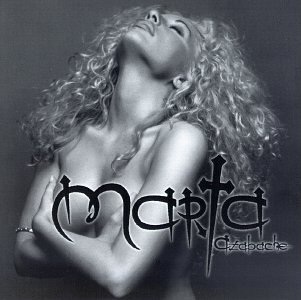
Azabache is the third studio album by Spanish singer Marta Sánchez. This was released in 1997. On this album more producers were involved along with longtime musical partner Christian De Walden. They created a rock oriented album, instead of the pop music Marta recorded for her first and second albums. Critical reactions were mostly positive. The first single "Moja Mi Corazón", features guitar player Slash and was produced by Nile Rodgers. The album yielded five singles: "Negro Azabache", "Algo Tienes", "Ya Ves" and "Amor Perdido". While promoting this album, Marta recorded along with opera singer Andrea Bocelli the song "Vivo por Ella", which became a worldwide smash hit and was later included on the international pressings of "Azabache". The majority of the tracks were recorded in English and were released under the title One Step Closer.
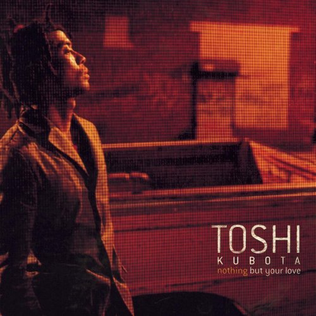
Nothing But Your Love is the tenth studio album of Japanese singer, Toshinobu Kubota, released on June 28, 2000.
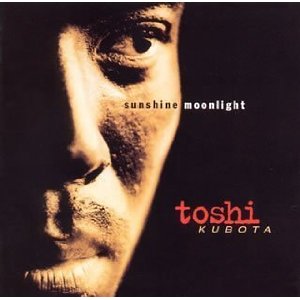
Sunshine Moonlight is the eighth studio album of Japanese singer Toshinobu Kubota, released on September 5, 1995. The album credited under the name, Toshi Kubota. This was also Kubota's first English-language album. The album's musical style ranges from 1980s–90s R&B and pop to funk elements such go-go. Synth instrumentation was not employed in recording most of the song as the album contains live instrumentation.

La La La Love Thang is the ninth studio album of Japanese singer Toshinobu Kubota, released on December 2, 1996. The album has been certified triple platinum by the Recording Industry Association of Japan. It was also successful in international music markets and yielded two singles: "Niji No Grand Slam" and "La La La Love Song". Kubota then embarked on his first international concert tour in 1996, which he titled the Oyeees! Tour. A live album, Toshinobu Kubota Concert Tour '96: Oyeees!, was released which featured footage from the tour. As of February 2012, La La La Love Thang has sold over 840,000 copies worldwide.

Machine II Machine is the fifth studio album by the German female hard rock singer Doro Pesch. The album was released in March 1995 and mixed by Kevin Shirley and Greg Smith. It is the most mainstream oriented album of the German singer to date, thanks to the production of Jack Ponti (Bon Jovi, Alice Cooper, Baton Rouge) and the collaboration of musicians and authors coming from pop, country and even Latin music. The lyrics break new ground for Doro, as many of the songs deal with erotic themes. The last track is a remix done by members of the German industrial metal band Die Krupps, who worked with Doro on her next albums. The limited edition of the album contains the bonus track "Tie Me Up ".
The discography of Japanese R&B singer Toshinobu Kubota consists of nineteen studio albums, ten compilation albums, two tribute albums, and over seventy singles. In 1985, Kubota signed with Sony Japan and began producing and writing songs for many of label's singers and groups. Under the label, Kubota released his first single, "Shitsui no Downtown" in June 1986, followed by "Time Shower ni Utarete" in December. Both songs were well received by radio, placing fifty-three and thirty-five on the Oricon Singles Chart. In September 1986, his debut album, Shake It Paradise, peaked at number twenty-two and remained on the Oricon Albums Chart for seven consecutive weeks. Shake It Paradise became certified million. The following year in 1987, Kubota's second studio album, Groovin', debuted at number thirty-three and was certified million. In February 1988, Kubota released "You Were Mine", which debuted at number two. In September 1988, Kubota released his third album, Such A Funky Thang!. The album peaked at number one and was certified million. The album also spawned the top-charted single "Dance If You Want It", which peaked at number three. In 1989, Kubota released his compilation album, The Baddest. The album also peaked at number one and was certified million.
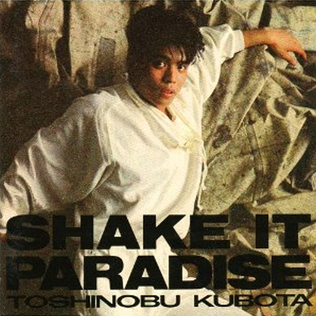
Shake It Paradise is the first studio album of Japanese singer Toshinobu Kubota, released on September 10, 1986. Under the label, Kubota released his first single, "Shitsui no Downtown" in June 1986, followed by "Time" in December. Both songs were well received by radio, placing fifty-three and thirty-five on the Oricon Singles Chart. "Shake It Paradise" peaked at number twenty-two and remained on the Oricon Albums Chart for seven consecutive weeks. Shake It Paradise became certified platinum.

Bonga Wanga is the fourth studio album of Japanese singer Toshinobu Kubota, released on July 15, 1990. Under the label, Kubota released his first single, "Be Wanabee" in October 1990, followed by "Mama Udongo" in March 1991. The lead single "Be Wanabee" charted at number 16 on the Oricon Weekly Singles chart. "Bonga Wanga" became Kubota's first album to peak number one on the Oricon Albums chart. The album also became certified million. That album contains several English lyrics.

"La La La Love Song" is a song recorded by Japanese R&B singer Toshinobu Kubota for his ninth studio album, La La La Love Thang (1996). The song was written by Kubota and produced by Yoichiro Kakizaki.
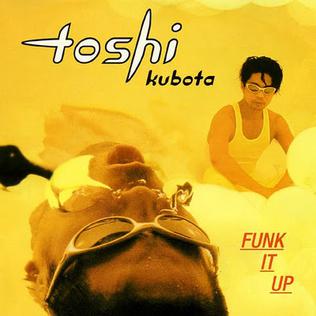
"Funk It Up" is a song recorded by Japanese R&B singer Toshinobu Kubota for his eighth studio album, Sunshine, Moonlight (1995). The song was written by Kubota and produced by Kubota, Kim Burse, Camus Mare Celli.

Kubojah: Parallel World I is the fifth studio album of Japanese singer Toshinobu Kubota, released on September 21, 1991.

Neptune is the sixth studio album by Japanese singer Toshinobu Kubota, released on July 1, 1992. The album charted at number 3 on the Oricon Monthly Albums chart and remained on the charts for total of 13 weeks. The album sold a total of 484,000 units, reaching double platinum certification.

Gold Skool is the sixteenth studio album of Japanese singer Toshinobu Kubota, released on August 3, 2011. The album charted at number 3 on the Oricon Albums chart and remained on the charts for total of 18 weeks. The album sold over 78,124 units in Japan.

The Baddest: Hit Parade is a compilation released by Japanese singer Toshinobu Kubota. This album was released in Japan at the end of November 2011 to commemorate the twenty-fifth anniversary of Kubota's music. The album charted at number 2 on the Oricon Weekly Albums chart and remained on the charts for a total of 38 weeks. The album became certified platinum, selling over 351,049+ units in Japan.

"Nagareboshi to Koi no Ame" is a song recorded by Japanese R&B singer Toshinobu Kubota for his sixteenth studio album, Gold Skool (2011).

"Love Rain (Koi no Ame)" is a song recorded by Japanese R&B singer Toshinobu Kubota for his compilation album, Love & Rain: Love Songs (2010). The song was released on June 6, 2010, as the lead single from the album.

"Tomorrow Waltz" is a song recorded by Japanese musician/singer Toshinobu Kubota. It was released on January 27, 2010, as the third single from Kubota's fifteenth studio album Timeless Fly.

Timeless Fly Tour was the concert tour by Japanese singer-songwriter Toshinobu Kubota in support of his fifteenth album Timeless Fly.

"Cheers for You" is the 31st single by Japanese entertainer Miho Nakayama. Written by Masato Odake, Nakayama, and Toshinobu Kubota, the single was released on May 17, 1995, by King Records.

















